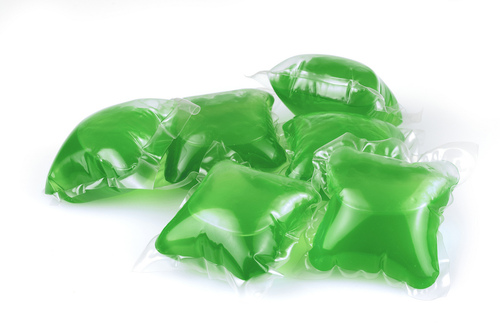
The U.S. Consumer Product Safety Commission (CPSC) is advising parents and caregivers to lock up single-load liquid laundry packets and keep them away from children.
Liquid laundry packets are attractive to children because they are soft and colorful and resemble familiar items like candy and teething products.
These items also dissolve quickly when placed in the mouth or are handled with wet hands. Children who are exposed to the chemicals are at risk of serious injury because they can be toxic.
In 2012, CPSC staff have learned of about 500 incidents involving children and adults who were injured by the packets.
CPSC recommends these steps to prevent unintentional poisonings and eye injuries:
- Do NOT let children handle laundry packets.
- Keep the liquid laundry packets sealed in their original packaging, and make sure they are locked up and out of a child’s sight and reach.
- If swallowed or exposed to the eye, immediately call Poison Help at 1-800-222-1222.
Learn more about the dangers of single-load laundry packets. (PDF)
Make sure that everyone gets to enjoy the holiday season by keeping the four-legged members of your family safe this December. It’s easy to get distracted at this time of year, so if you have pets, try to keep these ideas in mind:
- Avoid tinsel and clean up strings and ribbon right away. Swallowed decorations can seriously damage internal organs, leading to a painful and dangerous situation.
- Display and dispose of holiday plants safely. Poinsettias, mistletoe, and holly are toxic to cats, dogs, and horses, leading to bad gastrointestinal upset if eaten.
- Be careful with pet treats. Your lucky dog probably loves his biscuits, rawhides, or jerky sticks, but if he eats them whole - or too many at once - he may not be able to digest them. Unchewed treats can get stuck in the windpipe or gastrointestinal tract.
- Human food. Don’t feed your cat or dog people food. Food with bones (choking), chocolate, or xylitol (both toxic) can hurt your pet right away. Fatty holiday people foods can cause the painful and life-threatening disease pancreatitis in the long term.
Learn more about keeping your pet holiday-safe with this publication from the Food and Drug Administration.
According to the Centers for Disease Control, in 2010, more than 10,000 Americans died in alcohol-impaired driving crashes - one death every 48 minutes. That’s nearly one-third of all traffic-related deaths in the United States. Meanwhile, 17 percent of traffic deaths among children involved an alcohol-impaired driver. In half of those crashes, the young victim was riding in the vehicle with the alcohol-impaired driver. Drugs other than alcohol (e.g., marijuana and cocaine) are involved in about 18 percent of motor vehicle driver deaths.
Scheduled to coincide with the holiday season, December 2012 is National Impaired Driving Prevention Month. Whenever your social schedule involves alcohol, make plans so that you don’t have to drive after drinking. For example:
- Prior to any drinking, designate a non-drinking driver when with a group.
- Don’t let your friends drive impaired. Take their keys away.
- If you have been drinking, get a ride home or call a taxi.
- If you’re hosting a party where alcohol will be served, remind your guests to plan ahead and designate their sober driver; offer alcohol-free beverages; and make sure all guests leave with a sober driver.
Electricity bills can grow during the holidays if you decorate with strings of lights. Consider switching to LED (light-emitting diode) holiday lights to save energy and money. In addition to the energy and cost savings, LED lights are much cooler than incandescent bulbs, reducing the risk of fires.
Every holiday season, fires claim lives and cost millions in damage. To prevent holiday fires in your home, use nonflammable decorations; do not overload electrical sockets; regularly water Christmas trees; and avoid the use of lit candles. As you should do year-round, ensure that your smoke alarms are working.
Get more holiday tips.
If you plan to buy toys for the kids in your life, find help choosing age-appropriate and safe toys in this PDF.










